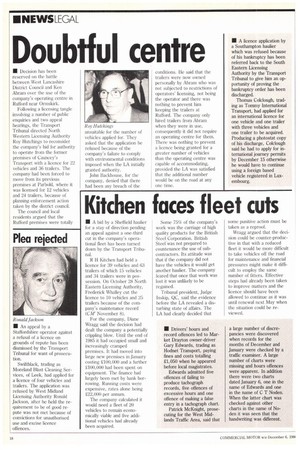Kitchen faces fleet cuts
Page 30

If you've noticed an error in this article please click here to report it so we can fix it.
• A bid by a Sheffield haulier for a stay of direction pending an appeal against a one-third cut in the company's operational fleet has been turned down by the Transport Tribunal.
R H Kitchen had held a licence for 39 vehicles and 63 trailers of which 15 vehicles and 34 trailers were in possession. On October 28 North Eastern Licensing Authority, Frederick Whalley cut the licence to 10 vehicles and 25 trailers because of the company's maintenance record (CM' November 8).
For the company, Diane Wragg said the decision had dealt the company a potentially crippling blow. Until the end of 1985 it had occupied small and increasingly cramped premises. lt had moved into large new premises in January costing £100,000 and a further &100,000 had been spent on equipment. The finance had largely been met by bank borrowing. Running costs were expensive, rates alone being £22,000 per annum.
The company calculated it would need a fleet of 20 vehicles to remain economically viable and five additional vehicles had already been acquired. Some 75% of the company's work was the carriage of high quality products for the British Steel Corporation. British Steel was not prepared to countenance the use of subcontractors. Its attitude was that if the company did not have the vehicles it would get another haulier. The company feared that once that work was lost it was unlikely to be regained.
Tribunal president, Judge Inskip, QC, said the evidence before the LA revealed a disturbing state of affairs. The LA had clearly decided that some punitive action must be taken as a reproof.
Wragg argued that the decision could be counter-productive in that with a reduced fleet it would be more difficult to take vehicles off the road for maintenance and financial pressures might make it difficult to employ the same number of fitters. Effective steps had already been taken to improve matters and the licence should have been allowed to continue as it was until renewal next May when the situation could be reviewed.














































































































